Toraja: on the land of legends
Sulawesi, a hidden gem of Indonesia, welcomes you for an unforgettable adventure. Here, you will move away from the beaten path and discover a world rich in culture, wild nature, and authentic experiences. Fascinating traditions of the Toraja people, unique funeral rites, meticulous architecture, lush landscapes, and crystal-clear waters are on the agenda in this region where every corner of the island tells its story. So, ready to explore this island treasure?
Itinerary
-
Day 1 From Makassar to the peaks of Rammang-Rammang
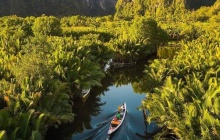 Welcome to Makassar, the largest city of Sulawesi!
Welcome to Makassar, the largest city of Sulawesi!
A driver will meet you on arrival this morning and take you to Rammang-Rammang, a picturesque village known for its impressive karst formations, rice fields, and peaceful rivers. On the way, you visit the archaeological caves of Leang Leang and discover stencils, artworks over 5000 years old.
Then enjoy the landscape and a walk through these stone gardens before boarding a traditional boat in the afternoon to go up the Pute River and disembark for a short walk among the locals.
Overnight by the river in Rammang-Rammang.1 hour by car, 2 hours of walking
Accommodation: Rammang-Rammang Ecolodge (Standard)
Meals included: none -
Day 2 Heading to Toraja Country
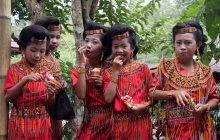 After breakfast, you leave Rammang-Rammang this morning heading to Rantepao, in the heart of Toraja country itself, known for its people with animist beliefs and unique funeral rites.
After breakfast, you leave Rammang-Rammang this morning heading to Rantepao, in the heart of Toraja country itself, known for its people with animist beliefs and unique funeral rites.
On the way, admire the beautiful landscapes and discover in detail the architecture and organization of a traditional Bugis house, characterized by its stilted structure.
Arrival at your accommodation in the early evening.7 hours by car
Accommodation: Toraja Misiliana (Deluxe)
Meals included: breakfast -
Day 3 In the heart of Toraja culture
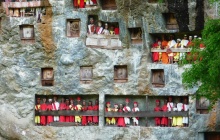 This morning, you will discover in turn your first villages of Toraja country and their rock-cut tombs called "lakkian" at Londa and Lemo.
This morning, you will discover in turn your first villages of Toraja country and their rock-cut tombs called "lakkian" at Londa and Lemo.
You explore a funerary cave at Londa and observe at these two sites the “balcony dead.” Called Tao-Tao by the Torajas, these are statues representing and honoring the deceased, watching the living from balconies built into the cliff.
You then continue your journey to Suaya in the south of Toraja country for a short walk through this charming village dotted with boat-shaped roof houses called "Tongkonan." Your walk leads you to one of the region’s royal tombs, usually reserved for the higher castes of the Toraja people.
Transfer afterwards to discover Ke'te Kesu, one of the oldest villages in the region, located amid rice fields.
Return to the hotel at the end of the day.3 hours by car
Accommodation: Toraja Misiliana (Deluxe)
Meals included: breakfast -
Day 4 Batutumonga: towards the highlands of Toraja
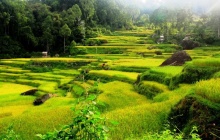 After breakfast, you visit the local market of Rantepao to discover the products that make up the daily life of the locals and see a multitude of water buffalo, a strong symbol of Toraja culture.
After breakfast, you visit the local market of Rantepao to discover the products that make up the daily life of the locals and see a multitude of water buffalo, a strong symbol of Toraja culture.
You then take the road to Palawa, one of the most beautiful Toraja villages. Some ceremonies and funeral rites are sometimes held nearby.
Next, you visit the village of Sa'dan, known for its tenun weavers, a dyed fabric and traditional clothing of the locals.
Then, head to Lempo for a very beautiful hike through the heights of the region. You will walk among and admire stunning terraced rice fields and cross small typical villages before reaching Batutumonga, a highland village of Toraja country surrounded by magnificent natural landscapes, mountains, and forests.
In the afternoon, you visit another funerary site called Kalimbunang Bori. Also recognized as a remarkable archaeological site, its uniqueness lies in the tribute to the deceased performed in a different way with enormous menhirs. Some "baby trees," graves of the youngest deceased in trees, can also be seen on the site.
Return to the hotel in the late afternoon.2 hours by car, 2 hours of walking
Accommodation: Toraja Misiliana (Deluxe)
Meals included: breakfast -
Day 5 Towards Sengkang: exploring Lake Tempe
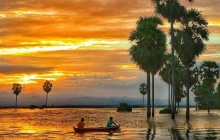 This morning, you leave Toraja country.
This morning, you leave Toraja country.
You continue your adventure towards Sengkang, where you reach the small lakeside port of the town and board motorized boats for a visit on Lake Tempe, enjoying its magnificent landscape as well as its maze of floating houses.
Meet the locals, then have dinner and overnight in their charming floating house.5 hours 30 minutes by car
Accommodation: with locals
Meals included: breakfast, dinner -
Day 6 On the way to Bira!
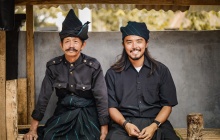 You continue the road this morning to reach the far south of Sulawesi.
You continue the road this morning to reach the far south of Sulawesi.
On the way, you will meet the Ammatoa people in the village of Kajang Dalam. Their unique ethnicity is fascinating! They maintain an ancestral way of life, beliefs, and rituals, and dress only in black. To connect with the "earth," they also walk only barefoot.
You then resume your road trip to arrive in Bira by the end of the day, a small blue paradise with its clear waters of Sulawesi.4 hours 45 minutes by car, 1 hour of walking
Accommodation: Bara Beach (Deluxe)
Meals included: breakfast -
Day 7 Tana Beru & its shipyard
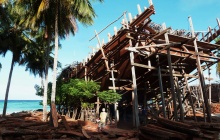 Free morning, then in the afternoon you take the road to discover Tana Beru. The cradle of future captains, this is where most boats are built to navigate Indonesian waters and sometimes even further.
Free morning, then in the afternoon you take the road to discover Tana Beru. The cradle of future captains, this is where most boats are built to navigate Indonesian waters and sometimes even further.
Take time for a walk on the beach and explore this vast shipyard.
Return to your hotel afterwards and enjoy a free evening.20 minutes by car
Accommodation: Bara Beach (Deluxe)
Meals included: breakfast -
Day 8 Bira: masks, snorkels, ready?
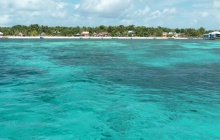 Sea air is on the agenda today! You board a local boat to explore the beautiful underwater world while snorkeling around the charming small island of Liukang Loe. Some turtles inhabit the waters around the islands, along with harmless reef sharks at times.
Sea air is on the agenda today! You board a local boat to explore the beautiful underwater world while snorkeling around the charming small island of Liukang Loe. Some turtles inhabit the waters around the islands, along with harmless reef sharks at times.
Relax on the island's beach, then take a short walk through the village where the locals are fond of... bonsais!
Return to the hotel in the afternoon and enjoy a free evening.Accommodation: Bara Beach (Deluxe)
Meals included: breakfast -
Day 9 Makassar: where it all began
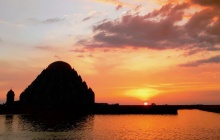 You say goodbye to Bira this morning and head back to Makassar, the starting point of our adventure.
You say goodbye to Bira this morning and head back to Makassar, the starting point of our adventure.
Arrival in Makassar at the end of the day and transfer to the hotel for your last night in Sulawesi.5 hours 30 minutes by car
Accommodation: Aston (Deluxe)
Meals included: breakfast -
Day 10 End of the adventure
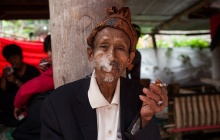 Depending on your flight time, transfer to the airport and end of our services. Have a safe journey!
Depending on your flight time, transfer to the airport and end of our services. Have a safe journey!
Meals included: breakfast
Period & budget
When to travel?
The best period for travelling is during the following months:
| Jan | Feb | Mar | Apr | May | Jun | Jul | Aug | Sep | Oct | Nov | Dec |
Price
€1370 per person, based on 2 people
The budget is an indication of the price per person, subject to availability. Your local agent will send you a customized quote with the exact price. The price can vary according to availability, level of services, period of travel, number of participants, booking time frame and other items.
Included
- Private transport with air conditioning, water on board & local driver
- Services of a local guide (subject to availability)
- Accommodation as described in the program or equivalent (subject to availability)
- Meals as indicated for each day
- Local guides when necessary
- Entrance fees to the sites and excursions offered
- Equipment needed for organized activities (snorkeling, etc.)
- A digital travel journal
- On-site assistance 24/7
Not included
- The international flights
- Meals not mentioned
- Activities outside the program & personal purchases
- Transport during your free days
- Tips (at each person's discretion)
- Visas & travel insurance
Notes
- Accommodations are listed for guidance and are subject to availability at the time of booking
- In Toraja country, the itinerary may be modified depending on funeral ceremonies or other rites to allow participation
- With locals, the comfort is basic, with shared sleeping arrangements and bathrooms. These accommodations, although more rustic, allow you to immerse yourself in local life. Hot water is sometimes not available in all accommodations
Terms and conditions
Booking conditions
Invoice procedure
Cancellation policy
- Cancellation received more than 30 days prior to the departure date: a sum of €50 per person will be retained
- Cancellation received 30 to 21 days before the departure date: your deposit, 30% of the total trip price will be retained
- Cancellation received 20 to 14 days before the departure date: 50% of the total trip price will be retained
- Cancellation received 13 to 7 days before the departure date: 75% of the total trip price will be retained
- Cancellation received less than 7 days before the departure date: 100% of the total trip price will be retained
- Fixed airfares: if your airline ticket was issued in advance, often done to avoid significant surcharges, you will be charged 100% of any non-refundable fees if you wish to change or cancel your flight plan.
- Fixed in-country costs: early charges for firm bookings will be charged if you cancel or modify your trip.
- Insurance costs: if you have taken out comprehensive or cancellation insurance, the cost of insurance is due and cannot be refunded.
Changes to travel contract
Pricing
Contract transfer
Insurance
Practical info
Staff
There are several types of support available:
- Drivers who speak English, or local languages (with limited English). Drivers are the logistical backbone of your trip and will tell you about their island and the different places you will visit. They act as stewards but will not participate in activities, where you will have complete freedom
- Guides who speak English. They can accompany local drivers and will guide you through activities and visits throughout your trip as described in your itinerary. Guides are not drivers
- Local guides (with limited English). Required for certain activities, they guide you only during those activities until they are completed
Food
Dinners, lunches, and breakfasts are taken in restaurants or at the hotel. Be careful not to drink water from a source you are not sure of. On walks, water must always be treated, and in town, only bottled water.
Transportation
Dinners, lunches, and breakfasts are taken in restaurants or at the hotel. Be careful not to drink water from a source you are not sure of. On walks, water must always be treated, and in town, only bottled water.
Budget & exchange
Indonesian Rupiah: the rupiah (IDR)
Visit this site to check the daily exchange rate: http://www.xe.com. Euros and dollars are accepted and exchanged for local currency without any problem at the airport and in the many exchange offices on the island. Cost of an average meal in Java: between €3 and €8; in Bali, food is better and restaurants are more expensive, so plan for €4 to €11 at most. There are many Visa and Mastercard ATMs in Bali (Denpasar, Ubud, Sanur). They allow you to withdraw rupiah, which will simplify your purchases on site. Each withdrawal is limited to about €100, but you can make multiple withdrawals in a row.
Shopping: Crafts to buy on site and awareness about the protection of animal and plant species: In general, travelers should avoid taking advantage of impoverished populations to buy traditional objects or items that are part of the country’s heritage (unless they were made solely to be sold to tourists). Agreements for species protection (CITES) – which aim to protect over 2,500 animal species and 30,000 threatened plant species – prohibit the trade of skins, ivory, scales, corals, shells, as well as the import of live exotic animals.
Tips
Tips are not mandatory and should be left to each person’s discretion. However, in Indonesia, it is customary to leave one when you are satisfied with the service provided. The amount depends on your appreciation of the service and should take into account the local economy. Tips that are too high, given the general standard of living in the country visited, can destabilize the local economic balance.
Vital equipment
The following list is indicative and aims to be as complete as possible.
- Cap or hat for the sun
- A bandana, scarf, or keffiyeh to protect the neck
- A pair of sunglasses, level 3 or 4 (glacier)
- 1 or 2 thermal underwear (short or long sleeve t-shirts)
- Cotton t-shirts (short and long sleeves) OR equivalent (shirts, technical t-shirts with quick-drying fabric...)
- 1 light fleece or equivalent
- 1 warm fleece or equivalent
- A breathable, waterproof windbreaker with hood, such as Gore-Tex or MTD +
- A rain cape
- 1 or 2 long shorts
- 1 comfortable hiking pants (ideally with removable legs)
- 1 spare pants (hiking pants or jeans or equivalent)
- 1 swimsuit
- 1 pair of waterproof, comfortable trekking shoes with high ankle and non-slip sole
- 1 pair of sneakers or equivalent light shoes for easy stages and evenings
- 1 pair of water sandals for snorkeling or swimming (especially for those who do not want to use fins while snorkeling)
- Thick socks for walking
Helpful equipment
- A headlamp + spare batteries
- Multi-purpose pocket knife
- Toiletry kit: biodegradable soap and shampoo, toothbrush, biodegradable toothpaste, razor, “no-rinse” hand wash gel, ...
- Microfiber towel: designed for travel, dries very quickly
- Bath towel or pareo
- Waterproof pouches such as "Zip Lock": to protect important documents like passport, money, or your electronic devices: cameras, phones, so they do not get wet
- Plastic bags or garbage bags: for waterproofing your belongings or for dirty clothes
- Camera and/or camcorder and spare batteries and/or rechargeable batteries (don’t forget the battery charger)
- Earplugs
Luggage
All your luggage should be divided into 2 bags:
Passport
Visa
Health information & recommendations
Weather
The climate is equatorial. Due to its position on both sides of the equator, Indonesia experiences a consistent climate throughout the year, with variations strongly moderated by maritime influences. Seasons are therefore less marked. However, in general, the south is less hot and drier. The average temperature ranges between 24 and 35°C.
Electricity
The electrical current is almost always 220V, except in some places where it is still 110V. Make sure to check before plugging in a foreign electrical device.
Sustainable tourism
Altaï Travel works for more responsible tourism and is committed to organizing trips that respect fair and sustainable principles.
The harmonization of practices ensures:
- A fair distribution of economic benefits
- Improvement of working conditions for local teams and raising their awareness of environmental protection
- Informing travelers about respecting local populations and the environment and collecting their feedback upon return
- Avoid leaving waste behind: dispose of it in bins or take it with you
- Use drinking water sparingly (prefer showers over baths and report leaks) and avoid wasting it (prefer biodegradable soaps for washing, etc.)
- Avoid damaging cultural sites: do not touch statues, do not move stones or objects, etc.
- Prefer exchanges over gifts (gifts that are too valuable compared to the local standard of living can destabilize the local economic balance)
- On walks, especially in fragile ecosystems, observe wildlife from a distance, stay on paths, limit trampling, and do not collect “souvenirs”: refrain from picking rare flowers, collecting fossils, etc.
- In some hotels, you will have individual air conditioning. It is strongly recommended, to avoid overconsumption of energy and greenhouse gas emissions, to turn it off whenever you are not in the room


